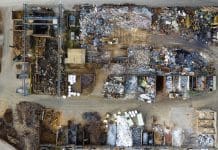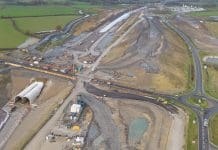HS2 has exceeded sustainability targets as ten construction sites go diesel-free completely, ahead of schedule
HS2 has announced that ten construction sites on the project have become 100 per cent diesel-free ahead of schedule, as the project continues to reduce its carbon emissions.
Seven construction sites in the Chilterns and Colne Valley, and three sites in London have completely eliminated diesel from their operation.
The announcement marks significant sustainability progress on the HS2 project
HS2’s original target of one diesel-free site in 2022 has been surpassed, granting optimism towards the overall target of entirely diesel-free construction sites by 2029.
Earlier this year, the Canterbury Road Vent Shaft in South Kilburn, managed by Skanska Costain STRABAG joint venture (SCS JV), became HS2’s first diesel-free site.
The Euston Approaches and Victoria Road Crossover Box sites, also managed by SCS, have now achieved diesel-free status. SCS JV aim to be fully diesel-free by the end of 2023.
SCS sites have moved to a combination of mains electricity, renewable energy and biofuels
Their first site – Canterbury Road Vent Shaft in South Kilburn, is connected to mains electricity on a 100% renewable energy tariff.
This powers a 160 tonne emissions-free fully electric crawler crane, as well as other electric plant such as electric compressors, with the rest of the machinery using sustainably sourced biofuels (HVO) as a direct replacement for diesel.
At HS2’s Euston Approaches the world’s first all-electric, high-capacity BAUER drilling rig cuts 1,200kg of CO2 per day and reduces noise by 50%, not only bringing environmental benefits but reducing disruption to surrounding residents during construction.
In addition, one of the tower cranes in the Euston Area has been fitted with the PUNCH Flybrid ‘flywheel’ energy recovery system, which stores and kinetic energy to use when needed to downscale peak energy demand and therefore cut energy consumption.
SCS’s third diesel-free site, Victoria Road Crossover Box has a mains electricity connection, is deploying electric equipment and making use of sustainably sourced biofuels (HVO).
The site recently successfully completed trials for two GeoPura 250kVA hydrogen power units (HPUs) – cutting carbon and improving air quality for workers and the local community.
HS2’s largest construction site will go diesel-free in 2023
Align – a joint venture formed of Bouygues Travaux Publics, Sir Robert McAlpine, and VolkerFitzpatrick, have also announced that seven of their 14 sites are now diesel-free.
As well as Align’s seven sites, the 136 acres (equivalent to 80 football pitches) Chiltern Tunnels South Portal, HS2’s largest construction site, is on track to become 100% diesel-free next year.
Over 120 pieces of plant including dumpers, tractors, excavators, pumps and crushers are all operating onsite using sustainably sourced biofuels (HVO).
The site is also using renewable energy sources such as solar power, and site safety gates powered by hydrogen, to reduce carbon impacts and improve local air quality.
Adetunji Lawal, Align JV’s carbon and energy manager said:
“Our strategy is to move to diesel-free operations across all of our construction sites, so we’re thrilled to say that half of our sites are now diesel-free. We estimate that Align will be able to deliver carbon savings that equate to 80,000 tonnes by the end of the project, supporting HS2’s zero carbon ambitions.”
“Another milestone” in HS2’s journey to net zero
Transport minister Huw Merriman commented on the achievement of ten HS2 construction sites going diesel-free:
“HS2 will help to transform the future of construction, decarbonise transport and help us deliver net zero, and leave as little trace as possible by planting millions of trees and creating innovative, low-carbon solutions for removing waste from construction sites.
“This is yet another important milestone in the journey towards diesel-free construction, as HS2 ensures this project has a minimal impact on the environment and local communities while transforming journeys for decades to come.”
Future progress will be outlined in HS2’s Diesel-free Plan
HS2’s ‘Diesel-free Plan: net zero future’ explains how the project will achieve 100% diesel-free construction sites by 2029, and details a new ratings system which ranks all sites from diamond to bronze, so progress can be mapped over the next few years.
Progress will be reported in the Environmental and Sustainability Progress Reports in future years.
It highlights that by the end of 2022, all joint ventures working on the HS2 Main Work Civils will have a plan in place to accelerate their own diesel-free ambitions.
Through 2023, HS2 will continue to facilitate green innovation trials on its sites, aiming to achieve additional diesel-free sites.
Between 2024 and 2029, HS2 will continue to work with the industry to pioneer cleaner and greener ways of working, unblock challenges and increase the use of reliable, proven diesel-free alternatives.






![[VIDEO] HS2 completes 4,600-tonne viaduct slide across M6 The HS2 team completed a 17-hour long operation sliding the viaduct structure across the M6 without closing the motorway](https://www.pbctoday.co.uk/news/wp-content/uploads/2025/12/M6-South-viaduct-slide-taking-place-across-a-live-motorway-December-2025-218x150.jpg)







